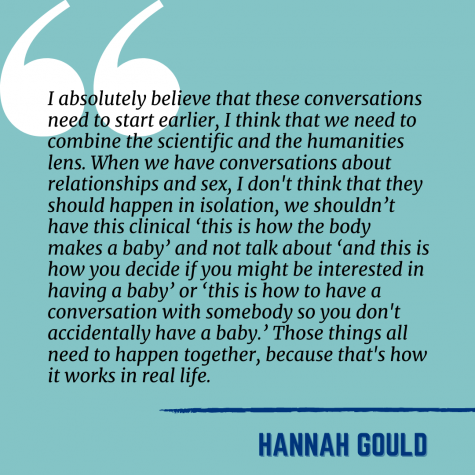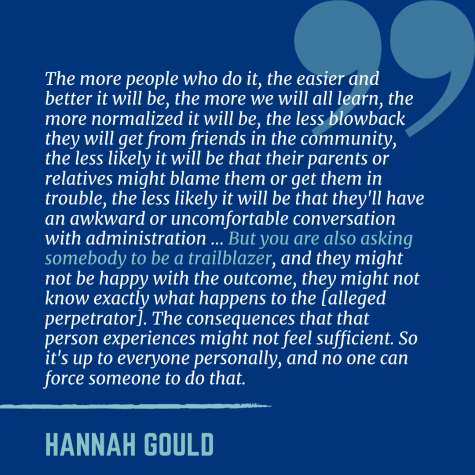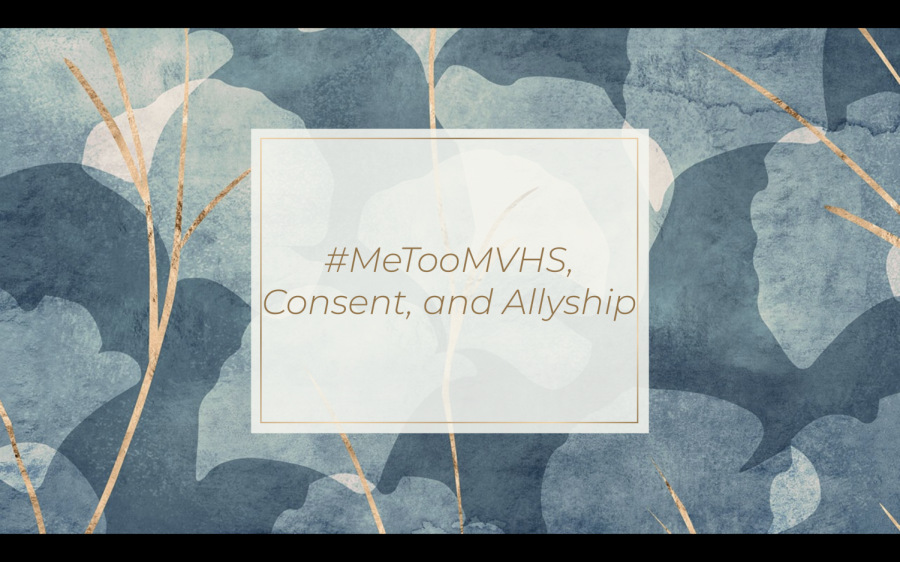Gould and Clausnitzer’s perspectives on providing immediate support and implementing systemic changes
April 22, 2021
When Gould first received information about the emerging allegations on social media and reports began coming to administration, she initiated a meeting where some staff members, including Clausnitzer, discussed how to proactively respond and have conversations.
“My main push in terms of the #metoo movement has been … we need to not only provide the opportunity for students to report cases of sexual assault and sexual harassment and follow through with timely and thorough Title IX investigations, which district leadership and administration have been doing an excellent job of doing,” Gould said. “But we also need to provide a lot of space for conversations, help students process emotions and provide a caring, supportive environment through which to make reports if that’s what students need to do, or just process and think and learn it, because there are so many students who are not in that position of actually having legal action to report but they’re still really, really impacted by the situation and overwhelmed by this new information that they’re learning.”
Gould says that they discussed how to address the situation as a staff and make students feel safe, how to further update the way Sex Ed. is taught and “provide opportunities for students to learn about things like positive and healthy relationships, how to express interest in people, how to think about what type of relationship you want to be in, and how to deal with manipulation and pressure, and all these things that come so far before we even get to these huge problems of sexual assault and sexual harassment.”
Gould emphasizes that it is necessary to create opportunities and spaces for everyone to engage in dialogue.
For instance, Gould shared the slides she was using in her Drama and Honors American Literature classes with the English department and offered them as a resource for people who may be looking for a starting point or guidelines to start conversations. Clausnitzer adds that he sent out an email to staff to help them come up with language they could use to talk to their students — like addressing the fact that students may have trouble focusing during this tough time — even if they chose to not use these slides.
“We talked about ‘How do we immediately think about support?’” Clausnitzer said. “Knowing that we don’t have a perfect process yet here at Monta Vista when things occur, in the context of truly having safe spaces. That’s something that we want to work on as a school so that when things do occur, whether they’re nationally, locally or just here at Monta Vista, we find a way to process as a school. We’re just not there yet, but we want to be there at some point in the near future.”
Additionally, along with English teacher Monica Jariwala, Gould talked to Clausnitzer and came up with the plan of open office hours where students could talk to any of the school’s guidance counselors to help them process.
Gould not only emphasizes the importance of conversations, but also the necessity of starting such discussions early on. Many students in the MVHS community have recently realized that they previously held misunderstandings about what classifies as sexual harassment. Gould points to early and comprehensive education as key to preventing such confusion.

“I think, if anything, being younger provides a more fresh perspective on issues of sexual harassment and assault,” Gould said. “Being an adult who’s already kind of been socialized by society for so many years, often your teachers are several steps behind you. This movement has been really illuminating and insightful for me as well and it has given me the impetus to learn more about the boundaries and parameters of harassment and assault and think more critically about what I think relationships should look like, and what characteristics of a positive relationship are necessary. But I absolutely believe that these conversations need to start earlier, I think that we need to combine the scientific and the humanities lens. When we have conversations about relationships and sex, I don’t think that they should happen in isolation, we shouldn’t have this clinical ‘this is how the body makes a baby’ and not talk about ‘and this is how you decide if you might be interested in having a baby’ or ‘this is how to have a conversation with somebody so you don’t accidentally have a baby.’ Those things all need to happen together, because that’s how it works in real life.”
In terms of having comprehensive Sex Ed. starting as early as elementary school, Gould says that even kindergarteners should be introduced to these topics by asking them questions such as “what kind of touching do you enjoy?” or “do you like getting hugs and holding hands?” or asking them how it feels when someone pushes them. As students move on to higher grades, a new level of complexity should be added, and discussions should be “infused with the subjects that we already teach and talk about in ways that are relevant and have real life applications for students and that are interdisciplinary.”
In order to further her goal of making these conversations multifaceted, Gould reached out to the FUHSD curriculum leads — Greg Merrick is FUHSD’s English curriculum lead and Kavita Gupta is a science co-curriculum lead — to set up a meeting and talk about the possibility of “providing a science and English professional development opportunity for teachers to learn about ways that we could potentially collaborate on enhancing and expanding Sex Ed.” Gould anticipates that this potential systemic change will come with challenges because implementing district-wide reform is a slow and bureaucratic process.
“I don’t expect that we’re going to see changes at the district level, specifically with instruction in any kind of comprehensive way, anytime soon,” Gould said. “But even if it’s something where this year, we could get to the place where there are a couple of teachers on each campus who have ideas, and are incentivized to meet during collaboration time or during their prep periods. Like, this science teacher and this English teacher are going to collaborate on ideas for how they’re going to do this unit in their class, and it’s totally optional, and only three sections of kids are going to get it but, that’s better than nothing. Even if that starts to happen, I think it will be a good step in the right direction.”
Honors American Literature was doing the Feminist unit when conversations about sexual harassment and assault began to surface. Gould says that in recent years, the Honors teachers have been trying to make the curriculum less completely traditional academic and more responsive to student needs. This, as well as the fact that this conversation fit so perfectly with their unit, provided the opportunity for them to temporarily shift gears to talk about the #metoo movement for multiple class periods.
“Our first idea was to have one day on it,” Gould said. “And we did those first set of slides that were like, ‘How are you experiencing this moment? What do you want to change in the way that the school is handling it?’ And then it just became so obviously apparent that students were like — I’ve been using the term ‘starving for this information’ — like they haven’t had the opportunity to have these conversations. They don’t know what a positive relationship looks like, they don’t know how to talk about sex … they need information. At the end of every period, in the last 15 minutes, the chat just fills up with all these super important questions or comments that reveal a little bit of misunderstanding and I’m like, ‘Oh, my God, we need to talk about that.’ And then kids are like, ‘Wait, this isn’t the last day for this conversation, right? Like, we’re gonna keep talking about this, right?’”
Gould adds that education and more accessible information is critical, particularly more theoretical examples and information that help people classify their own experiences. Although much of what goes on during the reporting or investigating process happens on a case-by-case basis and depends on extenuating circumstances, Gould says that many students and adults on campus are currently working to make as much information as possible public and accessible.
In terms of reporting, Gould adds that even though destigmatization is necessary, it is up to every individual when it comes to whether or not they choose to report.

“It would be great if justice could be served and we could investigate all of these situations and help people,” Gould said. “But I think that reality is not so simple. And there are many reasons why people have negative experiences when they report information. The more people who do it, the easier and better it will be, the more we will all learn, the more normalized it will be, the less blowback they will get from friends in the community, the less likely it will be that their parents or relatives might blame them or get them in trouble, the less likely it will be that they’ll have an awkward or uncomfortable conversation with administration … we all need normalization and practice with these conversations, because it’s already happening, we know it’s happening. But you are also asking somebody to be a trailblazer, to put themselves on the front lines, and they might not be happy with the outcome, they might not know exactly what happens to the [alleged perpetrator]. The consequences that that person experiences might not feel sufficient. So it’s up to everyone personally, and no one can force someone to do that.”
In her classes, Gould and her students have been talking about what she refers to as “safe and brave spaces,” which she says people need to create in their friend groups and relationships. She says that if students experience a classroom conversation that they feel is a positive model, they can apply that to relationships in their own lives, whether that means supporting someone experiencing harassment, calling out people for making sexist jokes or practicing consent and respecting boundaries.
“[Conversations are] where the real work happens,” Gould said. “Teachers can set up the foundation for that, therapists can set up the foundation for that, but it means nothing if you can’t have those conversations with the people who are actually in your life. And the more individuals do it, they set the example for it, and the easier it will be for everyone around that. So that is this enormous act of courage, that would make a huge difference. That’s really the whole point of it.”

